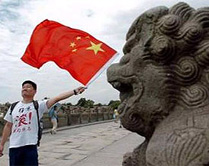
More than 1,000 people gathered at the Memorial Hall of the War of Resistance Against Japanese Aggression in Beijing Wednesday to mark the 67th anniversary of the July 7 incident that started the resistance war.
On the night of July 7, 1937, Japanese troops stationed near Lugou Bridge (also called Marco Polo Bridge) in the southwest of Beijing demanded to enter the nearby Wanping County seat on the pretext of searching for a missing solider. The Chinese troops rejected the demand and the Japanese troops then bombarded the county seat and Lugou Bridge. The local Chinese troops fight heroically back and thus started Japan's all-out aggression against China and China's War of Resistance Against Japanese Aggression.
The Japanese aggression caused 35 million deaths and casualties of Chinese people and US$600 billion of economic losses in China. China won the war eight years later.
Sixty-seven years later, Chinese people still have mixed feelings about Japan. While Japanese-made electronic goods and music are popular in China, numerous incidents still remind them that some clouds still exist in relations with Japan.
In the eyes of many Chinese people, Japan hasn't faced up to its war crimes during the Second World War. It has not done as well as Germany, which has fully repented its crimes in public.
"If a country refuses to repent its war crimes and at the same time seeks to become a military power, how can its neighboring countries rest assured," said a Chinese netizen.
Fang Jun, who has authored a book about a Japanese solider he knows, said both the Japanese and the Chinese people wished for lasting friendship between them, but it's impossible not to reflect on history and adopt correct views of it.
"Only through reaching a thorough and correct understanding of the historical incidents, can the Sino-Japanese friendship find a solid base for development," Fang said.
On Tuesday, Chinese Foreign Ministry Spokeswoman Zhang Qiyue said China is dissatisfied with Japanese Prime Minister Junichiro Koizumi's open remarks that he would continue to visit the Yasukuni Shrine.
Zhang said since the Yasukuni Shrine honored war criminals whose hands were covered with the blood of people of China and other Asian countries, China firmly opposed visits to the shrine by Japanese leaders.
"A proper attitude toward history constituted the political basis of Sino-Japanese relations and was an important condition for Japan to be trusted by Asia and the international community," Zhang said.
Another clear reminder of the war is the chemical weapons abandoned by the Japanese invaders, which still threaten the lives of people in Qiqihar, northeast China's Heilongjiang Province.
On August 4, 2003, mustard gas leakage from chemical weapons abandoned by Japanese invaders poisoned 43 citizens in Qiqihar City, one of whom died. As of August last year, 775 bombs and gas bombs abandoned by Japanese invaders had been discovered in the city.
In June this year, the Chinese government unearthed another 542chemical weapons in the city. People fear there are still more underground.
Besides the gathering at the memorial hall, located near the Lugou Bridge, Wednesday also witnessed a number of activities to mark the July 7 Incident in many parts of the country.
In east China's Jiangsu Province, young volunteers from universities and colleges treked to more than 30 villages to seek witnesses of the Nanjing Massacre and collect evidence and testimony for the incident.
The Nanjing Massacre happened in December 1937 when the Japanese intruders occupied Nanjing, the then capital of China. More than 300,000 Chinese were slain in the slaughter.
To remind people of the slaughter, a book exposing the atrocities of Japanese invaders in the massacre has been published recently in Nanjing.
Zhu Chengshan, curator of the memorial hall of Chinese people who were killed in the massacre, noted the book contains irrefutable evidence beating back Japan's right-wing forces who deny the slaughter.
Fu Min, a Beijing citizen, said the humiliation should inspire Chinese people to better build their country.
(Xinhua News Agency July 8, 2004)
|

